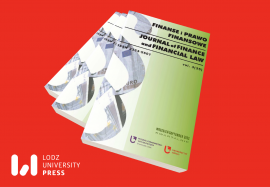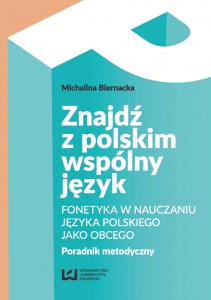Finanse i Prawo Finansowe | Tom 3 Nr 35
Opublikowano: 7 października 2022

Kwartalnik JoFFL jest recenzowanym czasopismem naukowym, w którym zamieszczane są oryginalne artykuły naukowe, często łączące teorię z praktyką, odnoszące się do finansów oraz powiązanych z nimi dziedzin. Łamy czasopisma są otwarte również dla przedstawicieli nauk prawych, którzy podejmują tematykę regulacji finansowych.
Celem czasopisma jest promowanie i publikowanie wyników badań z zakresu finansów, inspirowanie autorów, a także czytelników, do lepszego zrozumienia, zdefiniowania i wyjaśniania ważnych, w szczególności bieżących zjawisk oraz mechanizmów finansowych. Zadaniem czasopisma jest: udostępnienie forum do upowszechniania rezultatów badań oraz wymiany opinii, prezentacja indywidualnych i zespołowych dokonań naukowych.
Redakcja prowadzi stały nabór artykułów do czasopisma Finanse i Prawo Finansowe, którego redaktorami naczelnymi są Profesor Iwona Czechowska oraz Profesor Paulo Mourao.
The purpose of the article/hypothesis: The goal of this paper is to analyze tax evasion with special emphasis on gender. Factors influencing tax noncompliance such as age, income, education, confidence in government, political scale and religiosity are analyzed.
Methodology: Tax evasion is analyzed based on the most recent (Wave 7) World Value Survey data with the significance of differences between respondents, correlation and regression models analysis.
Results of the research: It has been found that there are significant differences between the global approach and groups of males and females when the acceptance of cheating on taxes is taken into consideration. The analysis of groups reflected the fact that all factors influence respondents in the same way without distinguishing between males and females.
Cel artykułu/hipoteza: Celem niniejszego artykułu jest zbadanie zależności między po-datkiem od zysków kapitałowych płaconym przez inwestorów a płynnością rynku wyra-żoną wielkością obrotu.
Metodyka: W niniejszym opracowaniu jako zmienną, na którą mogą wpływać podatki od zysków kapitałowych, zaproponowano miarę płynności rynku, wyrażoną wielkością obrotu. Niniejszy artykuł przedstawia nowe podejście do analizy płynności rynków kapita-łowych.
Wyniki/Rezultaty badania: Na podstawie analizy danych stwierdzono, że im wyższe podatki od zysków kapitałowych płacą inwestorzy, tym będą oni mniej skłonni do realizacji swoich zysków i tak wygląda sytuacja na wysoko rozwiniętym rynku (analizowany rynek amerykański). Jednak, jak wynika z uzyskanych wyników, w przypadku krajów europejskich reprezentujących rynki giełdowe po transformacji systemowej, im wyższe podatki od zysków kapitałowych, tym wyższy powinien być obrót akcjami na tych rynkach.
Cel artykułu/hipoteza: Celem niniejszego artykułu jest przedstawienie wpływu podatku od zysków kapitałowych na zwroty dwóch najpopularniejszych kryptowalut: BITCOIN i Ethereum Classic (ETC).
Metodyka: W niniejszym opracowaniu stopy zwrotu z wybranych kryptowalut zostały zaproponowane jako zmienna, na którą mogą wpływać podatki od zysków kapitałowych. Artykuł przedstawia nowe podejście do analizy zagadnień związanych z kryptowalutami.
Wyniki/Rezultaty badania: Wyniki pokazują, że dla wybranych krajów (Węgry, Włochy, Polska, USA) istnieje korelacja między stawką podatku od zysków kapitałowych a zwrotem z ETC. W przypadku BITCON-u jednak takiej relacji nie ma.
The purpose of the article/hypothesis: The goal of this paper is to present costs and taxes as a part of financial management process in companies listed on the WSE. In the hypothesis it is expected that costs influence taxes paid by companies in a negative way due to the tax avoidance purpose attitude presented by managers, and as a result, both liquidity and debt levels are influenced.
Methodology: Correlation coefficients and regression models are evaluated to find the answers for the research questions related to the relationships between tested variables.
Results of the research: The correlation between costs and taxes is negative as expected, as well as their relationship with the liquidity. Contrary to the expectations, the correlation between taxes and costs is mostly positive, alike the relationship between liquidity and debt. Findings are characteristic for the Polish market that is rather conservative in the approach to taxes, liquidity and leverage strategies compared to other developed markets. These findings prove that liquidity and debt management issues are subjective and related to the market behavior such as tax evasion attitudes.
The aim of the article: The purpose of this study is to provide a thorough review of the current state of cryptocurrency market and how governments perceive and deal with the threats and opportunities brought by the block chain technology. Cryptocurrencies were certainly the most popular investment in the last decade with a skyrocketing trading volume. However, cryptocurrency abilities in money laundering, financing terrorism and tax evasion overshadow the great opportunities and potential of this new technology. Therefore, the major economies in the world have been working on an efficient and effective strategy to control and tax the cryptocurrency market. In this study, the current state in Turkey regarding cryptocurrency taxation is analysed and a tax system is proposed. The authors claim that the Tobin tax, or in other words, low tax rates would be the best tax system to be applied in Turkey.
Methodology: The study is based on a detailed literature review on the subject, academic papers, news releases and legal acts of the USA, Europe and Turkey. Different attitudes of varied groups are discussed and proposed solutions in the subject are being considered.
Results of the research: Cryptocurrency market has a great potential and block-chain technology is full of opportunities. However, it is essential to control this market without harming the appeal of cryptocurrencies, yet this is not an easy task. Therefore, we argue that Turkey should extend the usage of cryptocurrencies, create a tax strategy with low tax rates and we claim that a regulation similar to the Tobin tax application would be effective here.
Zapraszamy do lektury!
Komentarze
Ten post dostępny jest także w języku: angielski





